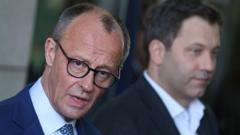After months of political instability, Germany's Christian Democrats led by Friedrich Merz have formed a coalition with the Social Democrats, marking an important step towards stabilizing the government amid rising pressures from economic challenges and rising populism.
Germany’s Coalition Agreement: A New Era Under Merz

Germany’s Coalition Agreement: A New Era Under Merz
Friedrich Merz’s Christian Democrats form a coalition with Social Democrats, ending months of political deadlock in Germany
Germany's conservative party, the Christian Democrats led by Friedrich Merz, has successfully negotiated a coalition agreement with the Social Democrats, bringing an end to over five months of political uncertainty in Europe’s largest economy. In a statement reflecting the significance of the deal, Merz, 69, emphasized that the agreement sends "a strong and clear signal" to both the German public and the EU that the nation is poised to regain a robust government capable of decisive action.
The coalition was born out of urgency, with the Christian Democrats having emerged as the leading party in the federal elections held five months ago amidst an increasingly challenging political landscape. Economic turbulence, exacerbated by international trade tensions and rising discontent among voters, has put pressure on the parties to act promptly. Recent polls indicate that the far-right Alternative for Germany (AfD) has gained momentum, making the new coalition even more crucial for the future stability of German politics.
While Merz awaits the parliamentary election next month to formally assume the chancellorship, he is expected to navigate his coalition with a comfortable 13-seat majority. In announcing the agreement, Merz described a committed path ahead, pledging to tackle issues such as military investment and urgent infrastructure repairs. These goals will follow a significant reform of Germany’s strict debt rules, which will enable substantial governmental spending.
Central to the coalition’s focus is a series of measures aimed at “controlling and largely ending irregular migration” alongside newly established border controls, reflecting urgent voter concerns highlighted during the preceding elections. As the parties prepare to seek approval from their members, Merz expresses optimism about embarking on vital reforms that promise to steer Germany back to its competitive forefront in Europe.
Simultaneously, Ipsos polling reveals that Merz’s conservatives trail slightly behind the AfD, signaling growing challenges ahead. Nevertheless, the coalition hopes to pivot public sentiment back towards stability and reform under Merz’s leadership in the coming months.
The coalition was born out of urgency, with the Christian Democrats having emerged as the leading party in the federal elections held five months ago amidst an increasingly challenging political landscape. Economic turbulence, exacerbated by international trade tensions and rising discontent among voters, has put pressure on the parties to act promptly. Recent polls indicate that the far-right Alternative for Germany (AfD) has gained momentum, making the new coalition even more crucial for the future stability of German politics.
While Merz awaits the parliamentary election next month to formally assume the chancellorship, he is expected to navigate his coalition with a comfortable 13-seat majority. In announcing the agreement, Merz described a committed path ahead, pledging to tackle issues such as military investment and urgent infrastructure repairs. These goals will follow a significant reform of Germany’s strict debt rules, which will enable substantial governmental spending.
Central to the coalition’s focus is a series of measures aimed at “controlling and largely ending irregular migration” alongside newly established border controls, reflecting urgent voter concerns highlighted during the preceding elections. As the parties prepare to seek approval from their members, Merz expresses optimism about embarking on vital reforms that promise to steer Germany back to its competitive forefront in Europe.
Simultaneously, Ipsos polling reveals that Merz’s conservatives trail slightly behind the AfD, signaling growing challenges ahead. Nevertheless, the coalition hopes to pivot public sentiment back towards stability and reform under Merz’s leadership in the coming months.






















